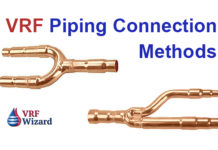Calculating Cooling Load
What exactly determines the size of the heating and air conditioning system and the required amount of air (CFM) to be delivered to the space? in this article we'll show you what goes into calculating the cooling...
VRF Systems and ASHRAE 15 & 34
When designing or considering the installation of a VRF (Variable Refrigerant Flow) system for a new building or a retrofit to an existing system, the ramifications of ASHRAE 15 can play a big...
VRF Ventilation
The building requirement for ventilation air and the methods of delivering this air vary by geographic location. We’ll discuss several methods commonly found in various region of the United States. Indoor air quality (IAQ) is important for occupant...
Refrigerant Monitoring Code Requirements
ASHRAE 15 requires the monitoring of refrigerant leaks under certain conditions within a mechanical room, but what about an occupied space where refrigerant is circulated through VRF/VRV (Variable Refrigerant Flow) Indoor Fan Coils? When is a...
ASHRAE looked at three types of flame-free mechanical joints that are used in refrigeration and air-conditioning systems, which included; Press/crimp fittings, compression fittings, and flare fittings. They also included a brazed joint as a bench mark against the time...
DOAS - Energy Recovery
When is an Energy Recovery system required according to ASHRAE 90.1 (2013)?
ASHRAE 90.1 2013
(Energy Standards for Buildings, Except Low Rise Residential Buildings)
When using a VRF Dedicated Outside Air System (DOAS) to bring in ventilation air to...
Ventilation for VRF Systems
Ventilation (outside air) can create havoc on occupant comfort if your VRF system isn’t sized or capable of handling the latent (moisture) content of the outside air. We will cover...




























